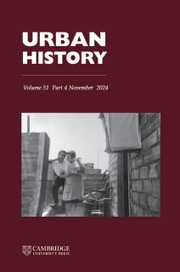No CrossRef data available.
Article contents
Research in urban history: a review of recent theses
Published online by Cambridge University Press: 01 August 1999
Abstract
Returning to the pattern of previous years, this review provides a broad overview of recent unpublished doctoral theses from both Britain and the United States – mostly completed in 1997. Employing a broad interpretation of ‘urban history’ which includes both the history of, and history in, urban areas, it consists of brief summaries based on abstracts published in the Aslib Index to Theses [ASLIB] and Dissertations Abstracts International[DAI]. The thirty-nine dissertations explore subjects ranging chronologically from the third millennium BC to the 1990s, with the majority covering the late nineteenth through to the mid-twentieth centuries, with another smaller concentration focusing on the seventeenth and eighteenth centuries. Spatially most cover British (15) and North American (10) subjects, though there are studies of elements of urban history in France, Germany, China, Venezuela and Cape Colony, as well as studies comparing British cities with similar places in France and Holland, Ireland and the United States. Though many different types of urban settlement are represented in the theses under review – including some of the earliest in Syro-Palestine – the British selection is dominated by work on London (7) along with a smaller number covering Belfast and Liverpool, whilst American studies include four exploring aspects of late nineteenth- and early-twentieth century Chicago and two on Caracas, Venezuela, in the same period. In terms of subject, ‘space’ – the theme of the recent Urban History Group conference in Oxford – features prominently, as does cultural politics ranging from a redefinition of the meaning of ‘misrule’ in the medieval period to two studies of the importance of culture in the American Civil Rights Movement and the eighteenth-century British and Irish port town. These newer organizing concepts and locations feature alongside the more usual subjects such as the law, policing, leisure, gender and ethnicity and a revival of interest in London, especially in the early modern period.
- Type
- Review Article
- Information
- Copyright
- © 1999 Cambridge University Press


